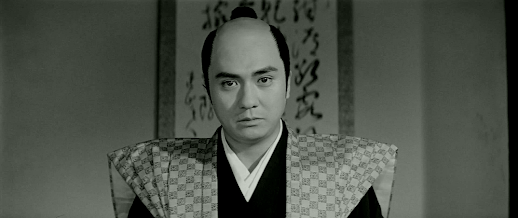Obscure Japanese Film #185
 |
| Miki Mori |
This Shochiku production opens with the legend, ‘There was a time when ritual suicide, upon the death of a feudal lord, was glorified as a gesture of loyalty in the name of Bushido’ followed by a shot of a desert-like landscape. A small figure appears on the horizon and begins running towards the camera, which then cuts to a close-up of the same figure – a young samurai running frantically in fear for his life. The camera then reveals he is being pursued by six men, who chase him up a steep sand dune. From a distance, we see them gaining on him until finally they cut him down.
This is a visually striking opening scene which grabs the attention immediately, partly due to the unusual setting, which doesn’t look like Japan, but must have been filmed at the Tottori Sand Dunes, located on the north coast of western Honshu, Japan’s main island. There’s no real reason given in the script to justify the use of this location, but it emphasizes most effectively the hostility of the world we are about to enter.

Junichiro Yamashita and Miki Mori
The remainder of the brisk 74-minute film concerns Lord Nobuyuki (Miki Mori), his wife O-Ko (Hizuru Takachiho) and his younger brother, Iori (Junichiro Yamashita), who are members of the Honda clan. After the death of the clan’s leader, Noboyuki is summoned by the chief retainer (Fumio Watanabe) and informed that Iori has been selected to perform ritual suicide in five days’ time as they need someone to follow their late lord in death. Noboyuki has precisely zero choice in the matter, and it is up to him to inform Iori, who is only 16 years old. O-Ko is especially distraught as she has raised Iori as if he were her son. Accepting that she can’t save his life, she makes the astonishing request that she be permitted to sleep with him so that at least he won’t have to die as a virgin…
Dealing as it does with the merciless inflexibility of the code of Bushido, all-too frequently applied in a way that resulted in the suffering of the lower ranking samurai while enabling the higher-ranking to escape responsibility, The Tragedy of Bushido (whose title could also be translated as ‘The Cruelty of Bushido’) has a great deal in common with Masaki Kobayashi’s later Harakiri (1962) and Samurai Rebellion (1967), so it’s surprising to find that a little-known filmmaker had made such an effective film on this topic as early as 1960. The filmmaker in question was Eitaro Morikawa (1931-96), who directed this film from his own original screenplay. Apparently, it was planned as Shochiku’s first ‘new wave period drama’. Morikawa had worked as an assistant director, mainly under Tatsuo Osone, but he had no previous credits as either screenwriter or director. Given the quality of this debut, one can only assume that he did something to incur the wrath of the studio heads at Shochiku* – he never directed again, and his only other credits are as co-screenwriter on three films for Nikkatsu and one for Toei between 1963 and 1966, one assistant director credit on Nagisa Oshima’s obscure 44-minute film A Small Child’s First Adventure (1963) and as a ‘planner’ on Kaneto Shindo’s Blackboard (1986). Morikawa had apparently been a classmate of Oshima’s and, after leaving the film industry, went on to work for the Dentsu advertising agency before becoming a university professor.
Morikawa is ably abetted by the high contrast cinematography of Takao Kawarazaki and unusual music score by Riichiro Manabe, while the non-starry cast are also effective (incidentally, Miki Mori died at the age of 26 from gas poisoning four days after the film’s release – a result of a leak rather than suicide, I think). Perhaps there’s a twist too many at the end, which is the only point at which the music goes a little overboard, but nevertheless this gem is an impressive debut which should have led to a long career for its writer-director.
* Miguel Patricio has more to say on the abrupt end to Morikawa’s career in his review (in Portuguese) here.
Thanks to A.K.
English subtitles at Open Subtitles




No comments:
Post a Comment